The Role of Community Resources in Outpatient Recovery Programs

Understanding the Crucial Role of Community in Recovery
Community resources and support systems play a vital role in outpatient recovery programs, providing essential services, emotional backing, and opportunities for social engagement. From recovery high schools to community centers, these resources create an environment conducive to sustainable sobriety. This article explores how community involvement, peer support, and specialized programs contribute to successful long-term recovery, emphasizing the importance of a holistic, inclusive approach.
Types of Community Resources Supporting Outpatient Recovery
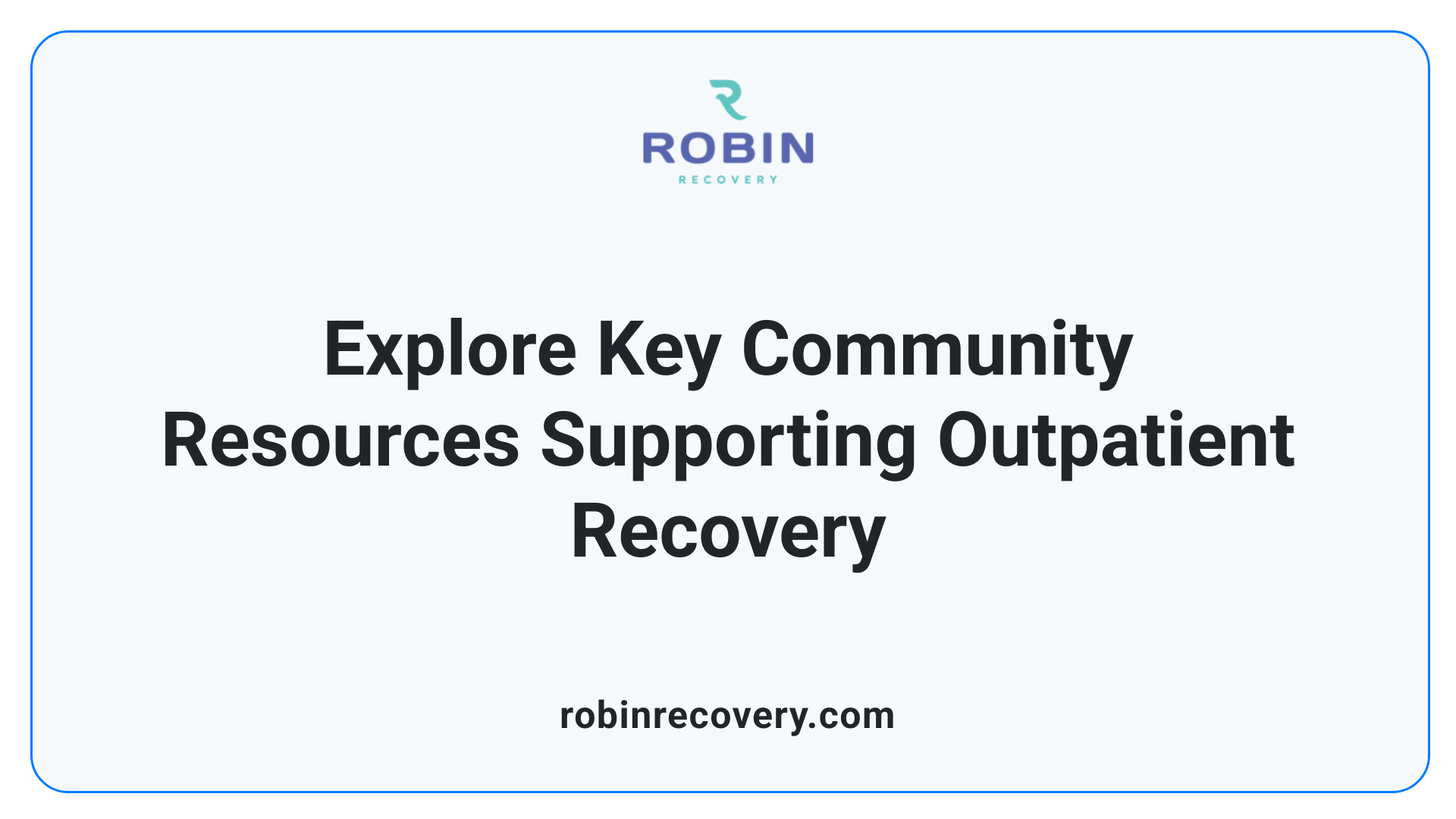
What resources support outpatient recovery programs involving community support?
A variety of community-based resources play a vital role in supporting outpatient recovery efforts. These resources help individuals maintain sobriety by providing social support, practical assistance, and access to services that address diverse needs.
One prominent resource is community centers, which offer educational programs, relapse prevention strategies, and social activities designed around recovery. These centers create a welcoming environment where individuals can build connections and access various support services.
Recovery housing is another critical element. These alcohol- and drug-free living environments foster peer support and accountability. Recovery homes often operate in conjunction with outpatient treatment, helping residents apply recovery skills in everyday life, increase engagement in treatment, and sustain long-term sobriety.
Support groups like Alcoholics Anonymous (AA) and Narcotics Anonymous (NA) are widely accessible and provide ongoing peer support. These groups meet regularly, offering shared experiences, encouragement, and structured programs such as 12-step meetings that reinforce sobriety.
Peer support and recovery coaches are increasingly recognized for their effectiveness. Trained individuals share their personal recovery journeys, providing emotional and practical guidance. They help navigate challenges, motivate sustained recovery, and connect clients with other community resources.
Housing and employment services additionally support stability outside treatment. Programs that offer housing solutions, employment counseling, and job placement assist individuals in rebuilding their lives, reducing stressors that could trigger relapse.
Mobile and web-based recovery applications complement community efforts by delivering ongoing support. These digital tools offer resources like relapse prevention tips, motivational messages, virtual meetings, and tracking tools that enhance recovery efforts, especially where in-person services are limited.
Numerous national and state-level directories facilitate access to nearby treatment facilities and community organizations. Websites like FindTreatment.gov and the AHCCCS Opioid Services Locator enable individuals to locate appropriate services based on geographic location and specific needs.
Helpline services from entities such as SAMHSA (Substance Abuse and Mental Health Services Administration) provide free, confidential, 24/7 referrals to treatment programs, support groups, and social services. These services do not require insurance and serve as essential connectors to community resources.
Culturally specific programs, especially those operated by Native American organizations, incorporate traditional healing practices alongside community support initiatives. These programs recognize cultural values, ensuring more relevant and effective recovery support for their populations.
Together, these diverse community resources strengthen outpatient recovery, offering comprehensive support systems that adapt to individual needs and promote lasting sobriety.
How Community Resources Facilitate Post-Treatment Recovery
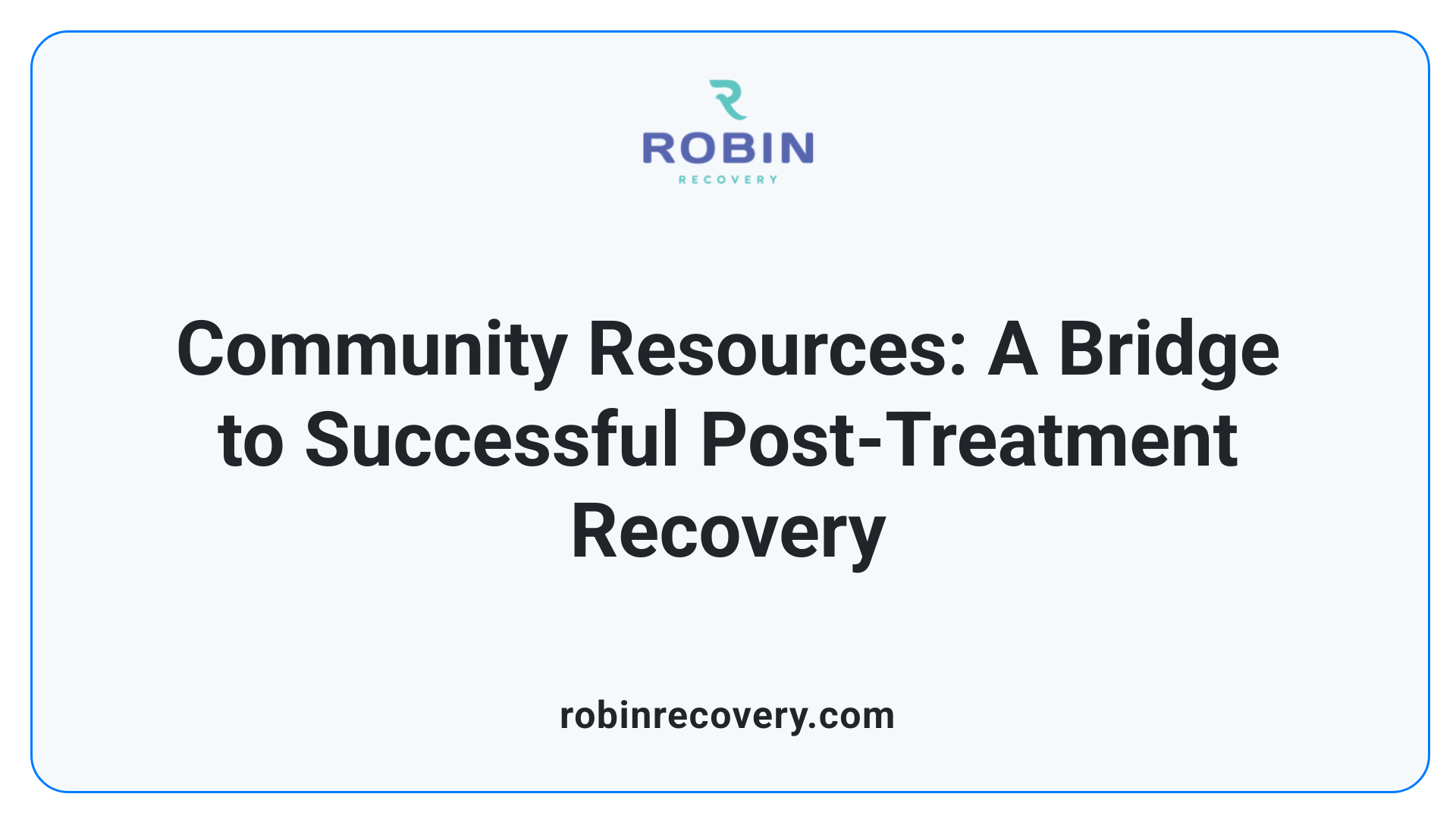
How do community resources facilitate the recovery process post-treatment?
Community resources are vital in supporting individuals as they transition from formal treatment towards independent sobriety. They offer a wide array of ongoing social supports designed to help maintain recovery and prevent relapse.
One of the primary roles of community resources is fostering peer connections and mutual-help groups. Programs like Alcoholics Anonymous (AA), Narcotics Anonymous (NA), and other support groups create spaces where individuals can share experiences, obtain encouragement, and build accountability networks. These peer-led organizations not only provide emotional backing but also reinforce communal bonds that remind individuals they are not alone in their recovery journey.
Building and strengthening social structures is another essential function of community-based services. Recovery community centers, recovery homes, and sober living environments serve as hubs where individuals can develop trusting relationships with others who understand their challenges. These environments help reinforce recovery skills and social trust, vital for long-term success.
Access to healthcare and stable housing is critical for sustaining recovery. Community agencies often connect individuals with medical providers and housing solutions, including supported housing options. Such stability reduces the risk factors associated with homelessness and poor health, which are common barriers in post-treatment recovery.
Employment and participation in social activities play a significant role in building a balanced, substance-free life. Community programs offer job training, employment support, and recreational activities that promote social engagement. These opportunities help individuals develop a sense of purpose, boost self-esteem, and establish routines that support sobriety.
Addressing broader socioeconomic challenges involves coordinated efforts among social services, healthcare providers, and community organizations. These systemic interventions aim to tackle social determinants of health—like poverty, unemployment, and social isolation—that can undermine recovery.
Overall, community resources serve as the bridge connecting individual efforts with the broader social fabric. They create a resilient environment that encourages sustained sobriety, promotes social reintegration, and supports long-term well-being by providing continuous, comprehensive support tailored to individual needs.
The Impact of Peer Support and Community Engagement on Long-Term Recovery
How do community engagement and peer support influence long-term recovery from substance use disorder?
Community involvement and support from peers are vital components in maintaining sobriety over the long term. They create an environment where individuals recovering from substance use disorder can find mutual understanding and hope through shared experiences.
Shared lived experiences form the foundation of trust and empathy in support groups and community settings. When individuals hear others' stories of struggle and success, it reinforces that recovery is possible and validates their own journey. This sense of shared purpose fosters motivation and decreases feelings of isolation, which are common triggers for relapse.
Support groups, such as Alcoholics Anonymous, Narcotics Anonymous, and online communities, provide a safe space where members can openly discuss challenges and celebrate successes. These interactions help build trust over time, creating bonds that serve as emotional anchors during difficult periods.
Research indicates that active participation in community and peer support activities substantially lowers relapse rates. By staying engaged with a network of understanding individuals, recovering persons gain ongoing encouragement, practical advice, and accountability, vital for long-term success.
Building social bonds within recovery communities enhances self-efficacy—the belief in one's ability to stay sober—and resilience—the capacity to bounce back from setbacks. These psychological strengths are crucial for navigating life’s stresses without resorting to substances.
Furthermore, community engagement helps address social determinants impacting recovery, such as economic stability and social support, by connecting individuals with resources like housing, employment, and healthcare. This holistic approach increases the likelihood of sustained recovery.
In summary, peer support and active community participation nurture a sense of belonging, bolster motivation, and develop resilience, all of which are essential for enduring sobriety. When integrated with clinical treatment, these social elements significantly enhance long-term recovery outcomes.
The Benefits of Community Support in Addiction Recovery
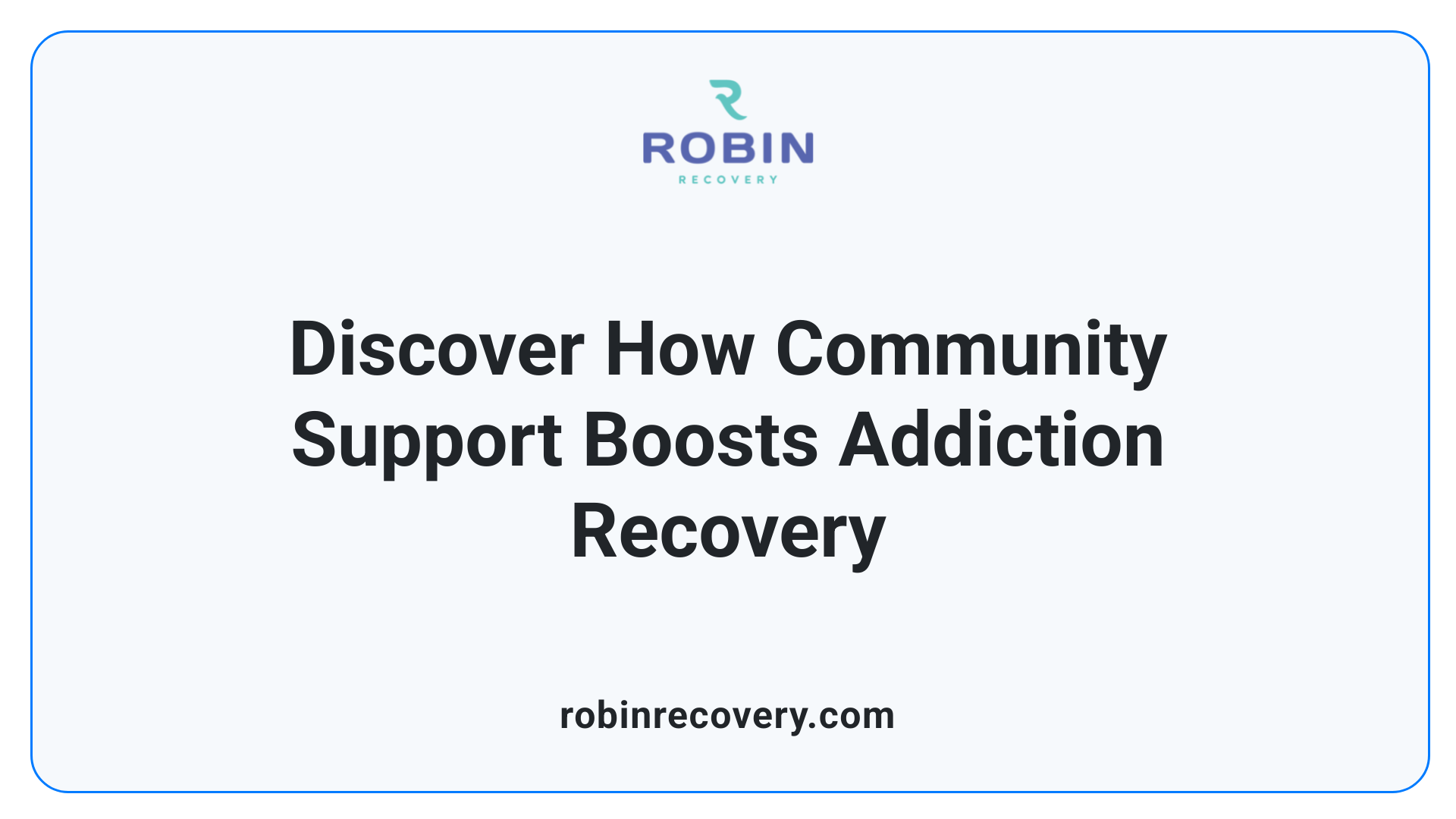
What are the benefits of community support in addiction and substance use disorder recovery?
Community support is a cornerstone of successful addiction recovery, offering numerous emotional, social, and practical advantages.
One of the primary benefits is the enhancement of social connections. Support networks—such as recovery community centers, peer-led groups, and recovery housing—connect individuals who share similar experiences. These shared connections foster understanding, empathy, and encouragement, which are vital in overcoming feelings of loneliness that often accompany addiction.
Reducing feelings of isolation is another critical benefit. Many individuals battling addiction experience stigma and loneliness, which can trigger relapse. Engaging with supportive communities provides a sense of belonging and acceptance, reinforcing their commitment to sobriety.
Community groups and mentorship programs offer practical guidance and accountability. Peer mentors and recovery coaches share their own journeys, providing insights and encouragement that motivate others to stay on track. Regular participation in support meetings helps establish routines and habits conducive to long-term sobriety.
Access to vital services is often facilitated through community networks. These include counseling, housing options like sober living environments, employment support, and healthcare services. Connecting individuals with these resources addresses broader social determinants of health, supporting physical and mental well-being.
Being part of a community also boosts motivation and hope. Witnessing others' successes can inspire individuals to persist through challenging times. The shared victories within recovery groups foster optimism and resilience.
Creating an environment of support and positivity is essential for sustained recovery. Community settings offer a safe space for discussions, sharing struggles, and celebrating milestones, all of which reinforce an individual’s commitment to sobriety.
In summary, community support provides a comprehensive framework that nurtures recovery through emotional validation, resource sharing, and mutual encouragement. Engaging in these networks significantly increases the likelihood of maintaining sobriety, reducing relapse rates, and achieving a healthier, more fulfilling life.
Specialized Programs Supporting Outpatient Recovery
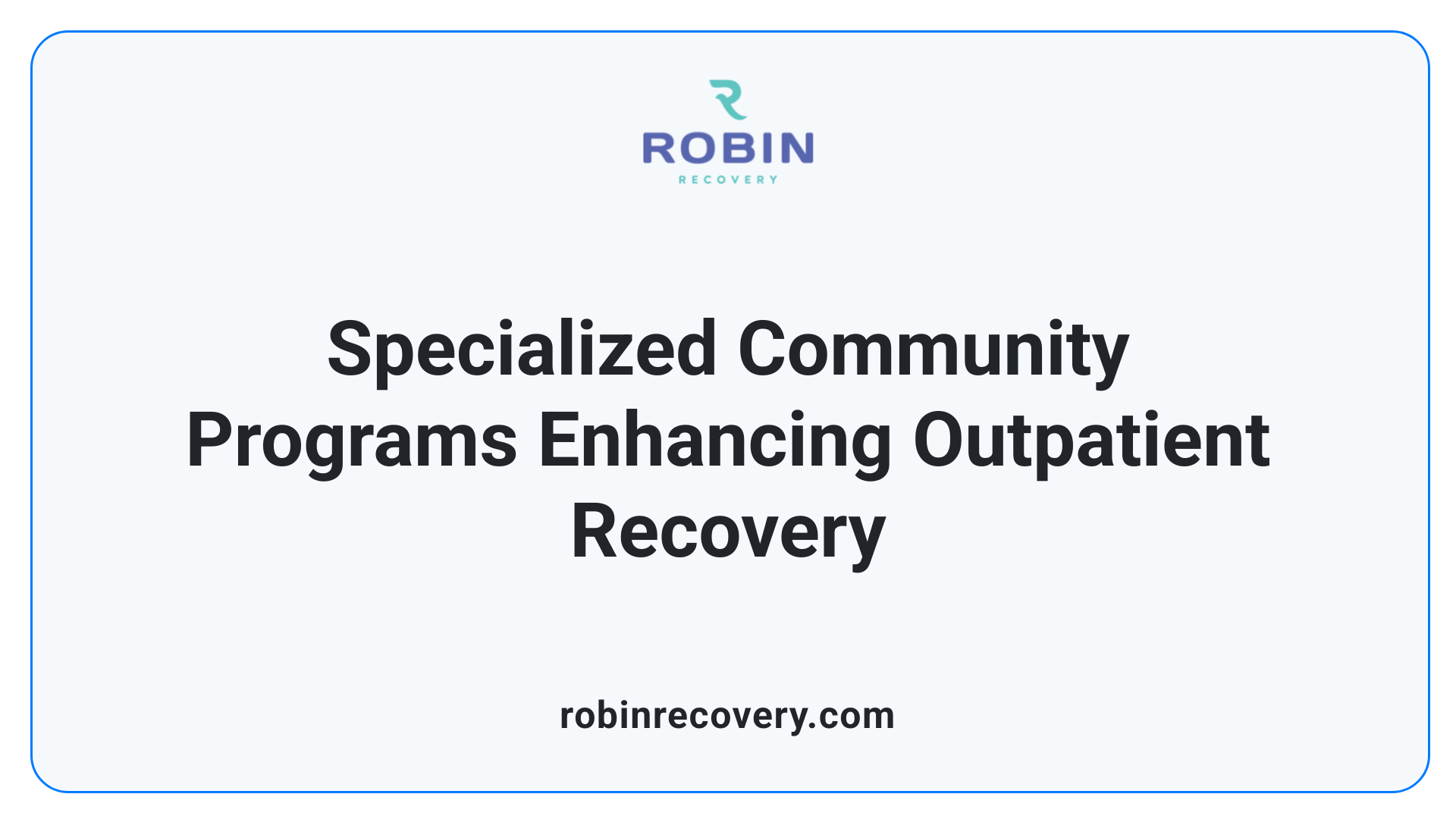
What is the role of community in recovery?
The community plays a vital part in supporting individuals on their path to recovery from addiction. It provides more than just social interaction—it offers a foundation of emotional support, motivation, and a sense of belonging that can significantly influence long-term sobriety.
Recovery communities create opportunities for individuals to participate in substance-free activities, forge healthy relationships, and establish routines that promote stability. These groups foster mutual accountability, where sharing experiences and encouragement from peers helps reduce feelings of loneliness and isolation. Engaging with community-based resources such as support groups, faith organizations, and educational programs reinforces commitment to sobriety and mental health.
Support systems like recovery high schools, collegiate recovery programs, and sober living environments serve different needs but all contribute to a broader network of care. Recovery coaches and community centers facilitate access to resources like relapse prevention, employment assistance, and social engagement activities.
Furthermore, culturally tailored programs ensure that diverse populations receive respectful and relevant support, increasing engagement and effectiveness. Integrated treatment approaches that address co-occurring mental health conditions also benefit from strong community ties, emphasizing holistic care.
In essence, a supportive community creates a reassuring environment where individuals feel understood and empowered, which is essential for maintaining recovery over time. This social fabric reduces relapse risk and fosters resilience, emphasizing that recovery is not only an individual effort but a community-supported journey.
The Influence of Recovery Housing and Community Centers
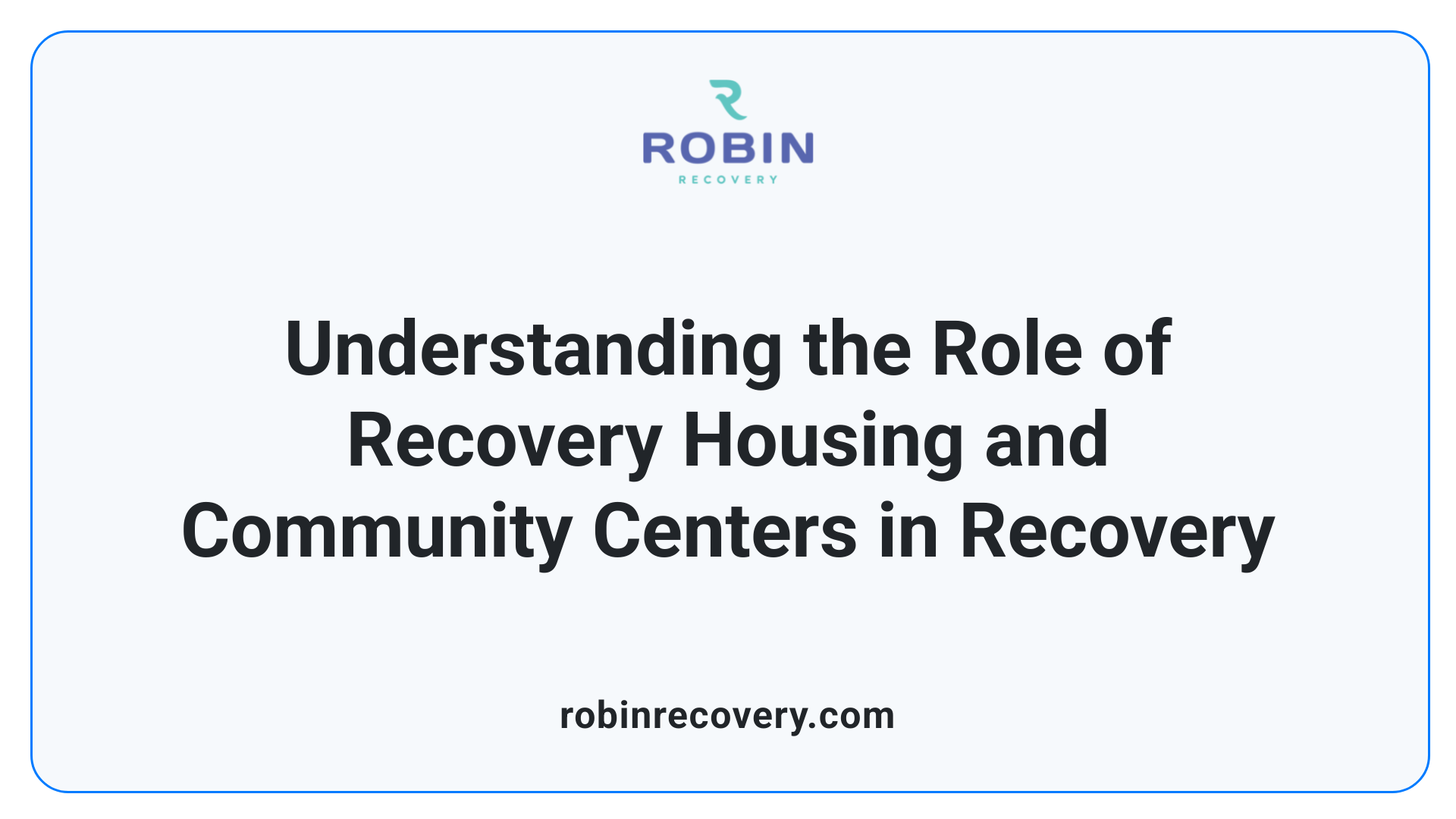
What is the role of recovery housing and community centers in outpatient recovery programs?
Recovery housing, often known as sober living environments, plays a vital role in supporting individuals recovering from alcohol and drug use disorders. These are alcohol- and drug-free living spaces that offer peer support, fostering an environment where residents can practice recovery skills, build social connections, and maintain accountability.
Often linked with outpatient treatment programs, recovery housing provides more than just a safe place to live. It offers social support, mutual aid opportunities, and a structured routine that encourages sobriety. Structured sober living environments are associated with higher treatment retention rates and improved outcomes, including longer treatment stays and better discharge satisfaction.
Residents in recovery housing value the sense of accountability and the opportunity for communal learning. They find environments that promote social and emotional support crucial for long-term sobriety. These homes help build recovery capital—the internal and external resources necessary to sustain recovery—by providing affordable housing, social networks, and opportunities for personal growth.
Community centers complement recovery housing by offering social activities, educational programs, and resources that aid social reintegration and wellness. These centers serve as local hubs where individuals can access mutual-help meetings, such as Alcoholics Anonymous or SMART Recovery, participate in wellness activities, and connect with others who share similar recovery goals.
Together, recovery housing and community centers create a supportive ecosystem. They enhance treatment engagement and retention, promote healthy lifestyles, and foster social cohesion—all vital factors in achieving and maintaining long-term sobriety.
Harnessing Community for Sustained Sobriety
Community resources and support networks are integral to the success of outpatient recovery programs. Through specialized programs, peer support, recovery housing, and community engagement, individuals are empowered to overcome challenges, build resilience, and sustain their sobriety in a supportive environment. Strengthening community involvement, expanding access to diverse resources, and fostering inclusive support systems are essential strategies in enhancing long-term recovery and improving overall well-being for those battling addiction. The collective effort of communities can transform recovery journeys into stories of hope, healing, and lasting change.
References
- The Emergence, Role, and Impact of Recovery Support Services
- Community Resources & Recovery Supports | The Academy - AHRQ
- The Importance of Community in Recovery - 7 Summit Pathways
- The Role of Community and Support Systems in Addiction Recovery
- The Role of Community in Your Recovery
- Enabling or Engaging? The Role of Recovery Support Services in ...
- Recovery Community Centers
- Importance of a Recovery Community | Chicago IL | Gateway
- Who Addiction Affects And Community Resources
